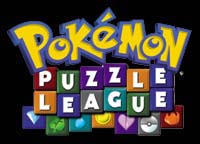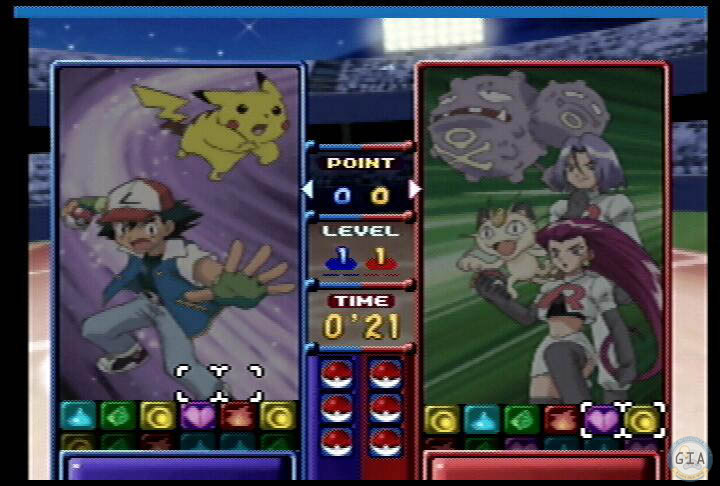
 |
|
There's no way around it: Pokémon Puzzle League is Tetris Attack. The programming wizards at the U.S.-based Nintendo Software Technologies have turned out yet another bionic port of a cult classic: better, stronger, and faster than the original. Cuter, too; Pokémon Puzzle League milks its Pokémon license at every opportunity to mixed effect. But the core gameplay remains the same as ever--if not better--and Pokémon and puzzle game fans alike would be hard pressed to find a better title.
Our Tetris Attack vault provides the best gameplay synopsis of the "Panel de Pon" family of puzzle games. Essentially, the player must swap adjacent blocks to form three-in-a-row combinations either vertically or horizontally. Break four or more blocks simultaneously to form a "combo." After blocks break, unsupported blocks fall down, leading to the possibility of "chains." Panel de Pon's true genius, however, lies in "skill chaining." As blocks break, gamers are given a fraction of a second in which to continue swapping, arranging, and otherwise tweaking the layout of the board. Quick-witted and nimble-fingered gamers can thus extend chains almost without end; instead of just watching chains unfold, gamers take an active, frantic role in keeping them going. The two player mode introduces "garbage blocks" and "garbage chaining". If a player forms a chain or combo, a large, solid chunk of unusable "garbage" will fall on his opponent. A break made adjacent to the garbage turns the block (or part of the block) into useable puzzle blocks. Again, fast gamers can rearrange existing blocks underneath the garbage as it transforms into useable puzzle pieces. If the newly-formed pieces fall into a horizontal or vertical line, the player gets a chain. Advanced players can whittle away at garbage blocks line-by-line to form chains of otherwise impossible magnitude. Six different modes are available in Pokémon Puzzle League, each based around a different location in Pokémon Puzzle League Village: the 1- and 2-player Stadiums offers the standard one-on-one gameplay, either against the computer or a friend. Marathon Zone allows one player to try to score as many points as possible while competing against an ever-quickening flow of blocks (as in the original Tetris). Time Zone challenges the players to complete as many block matches as possible within two minutes. Puzzle University serves as the obligatory limited-move puzzle mode. Mimic Mansion guides you step-by-step through advanced skill chain techniques. The Spa Service pits you against Team Rocket in a battle to lower the stack beneath a certain height. Most of these gameplay modes have already been seen in Tetris Attack, but gamers are sure to appreciate the depth of play. The game truly shines with new gameplay options that give it an advantage even over the original Tetris Attack--blasphemy, I know! A "3D mode" places the blocks around the edges of a boundless cylinder. In practice, this is little more than a gimmick; the game's true strength still lies with its traditional 2D mode. Even so, the 3D mode is at least diverting, entertaining, and still more fun and balanced than most puzzle games. An in-depth record mode lets multiple gamers save their badges, trophies and diplomas, as well as their best score, chain, combo, time, and number of continues used for all requisite modes. The game also saves versus records between player profiles, letting you and your friends finally know once and for all who's the greatest. The puzzle mode has been enhanced with both 3D and "Action" puzzles that require skill chaining to solve. A puzzle edit mode lets you create and save your own puzzles. The single-player difficulty has been significantly increased. Very Hard is much harder, and an all-new Super Hard difficulty (which we've nicknamed "Agent Mode") is guaranteed to challenge even the most advanced Tetris Attack fan. The computer assaulting you with a 10-chain opening volley is enough to strike fear into the heart of even the most skilled fan--and once you watch it skill and garbage chain, you'll be sobbing for your mommy.Puzzlers weaned on Tetris Attack will be pleased as punch to find an option to use "classic" blocks over the new Pokémon-themed designs. You can even turn off the traditional "question mark chain," allowing chains to finally be counted higher than 14, and toggle the "bullet time" slow motion effect on and off. NST is clearly packed with hardcore Tetris Attack fans who set out to create a title they'd prefer to the original version; while their preferences are unknown, most gamers will feel they succeeded. As previously mentioned, Pokémon Puzzle League uses its Pokémon license at every opportunity. Players select one of twelve Pokémon trainers at the start of their game; before each match, they select one of that trainer's three Pokémon to "fight" for them. The stage background and graphics then reflects the choice of trainer and Pokémon. Puzzle and garbage blocks are Pokémon themed. Original music, sound effects, Pokémon voices, and even full motion video sequences (!) have been created for this title with the creative talent behind the animated series. A few hours with Pokémon Puzzle League and you, too, will be living in a Pokémon world. Don't like Pokémon? They're too omnipresent to be entirely ignored, but changing the blocks to "basic" Tetris Attack blocks and muting the oft-repeated vocal effects is a good start. It's slightly unfair to fault Nintendo for slapping the ubersuccessful Pokémon license on the title, too, when one considers that the original Japanese Panel de Pon had neither the Super Mario World characters (it starred fairies) nor the household Tetris name. Regardless, this is no cut-and-paste job; the game has been reworked from the ground up to present a Pokémon experience, and there's no denying its slick presentation. In the end, however, the rock-solid gameplay and depth of options overpower any Pokémon likes or dislike. All the presentation in the world is just window dressing on the unflappable gameplay core. Pokémon Puzzle League is the most rounded and option-filled version of the deepest and most challenging puzzle game ever created. Review by Andrew Vestal, GIA. |
|
|||||||||||||||||||||||||||||||||||||||||||


